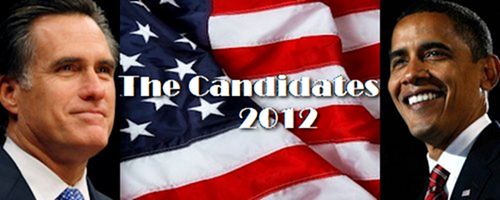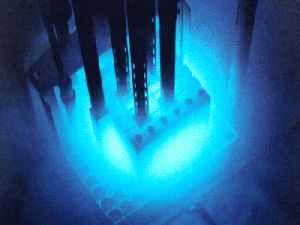
The Candidates and Energy 2012
Energy is not the crisis it is made out to be, but it is still an incredibly important political issue. With concerns about manmade carbon emissions, the nuclear accident in Japan, and slowly dwindling supplies of oil being constantly hyped in popular media--along with high prices being charged at the gas pump--it is no wonder that energy policy ranks relatively high on the list of issues that matter to the American people. On the bright side, as technology improves, so do our hopes for a secure energy future. The question, then, is what role our government should play in securing it.
 | | Energy is pretty |
Regular readers won't be surprised to learn that I think the government should have very little to do with it, though there is a vested interest in the federal government securing the national energy infrastructure. Four years ago, when Libertarian candidate Bob Barr proposed ending all subsidies and tax breaks for energy companies, I thought it was too extreme. Now, though, I think it's the only rational course of action if the ultimate goal is stable, clean energy. When the federal government can move money around to pick winners and losers at will, you wind up with price controls and special interests that only serve as a drag on progress.
This is not to say that the government should be completely divorced from energy policy, because there is certainly cause to enforce environmental laws and regulations, as long as those laws and regulations are reasonable and created through Congress. I don't believe we're going to hit "peak oil" anytime soon, nor do I believe our carbon emissions are going to cause an apocalypse on the day after tomorrow, but it is not foolish to put safeguards in place to help prevent manmade environmental disasters, though it is of course impossible to eliminate them entirely.
For these reasons, I want a candidate who will do less, not more, when it comes to energy policy. Double-check the efficacy of every law and environmental regulation, work to eliminate those that don't make sense, end subsidies and tax breaks, and make sure we can be as self-sufficient as possible while making energy importation and trade easier rather than harder. I don't pretend that these issues are easy or simple, but a cool-headed approach can go a long way.
Domestic Oil and Natural Gas
We should be tapping as much oil and gas from our own land as we possibly can, and we need to build enough refineries to process it. This country can do it better and cleaner than most of the countries we import oil from, so even from an environmental standpoint, true energy independence is a goal worth reaching for. From other perspectives--national defense, jobs, etc.--it makes just as much sense. Look, alternative energy isn't going to give us a new and better infrastructure tomorrow, and the process of weaning ourselves off of oil and gas is a painfully gradual one, no matter how inevitable it seems. Therefore, when it comes to domestic production, I want a president who will not stand in the way of drilling everywhere we can and refining our own product. I know the BP oil spill has raised concerns about the safety standards of offshore drilling, but if we allow drilling in shallow waters and don't let special interests prevent us from enforcing the regulations that are already on the books, the chances of such a spill happening again will be drastically reduced.
 | | We should ask Todd Akin and Whoopi Goldberg if this rape of Mother Earth is "rape rape" |
Mitt Romney's plan is to "empower states to control onshore energy development," "establish the most robust five-year offshore lease plan in history," implement new energy assessments using modern technology, and both "strenghtening and streamlining" federal energy regulations [1]. He goes into great detail outlining his plan, which he argues can secure "North American energy independence" by 2020, citing various analysts, experts, and scholars [2].
Obama promises to end "Big Oil" subsidies, increase fuel efficiency standards, resist calls to open up "sensitive lands and coasts" to drilling, increase safety standards, and get us halfway to energy independence by 2020 [3]. In his first term, he did offer over 37 million new acres for offshore drilling in the Gulf and has overseen an increase in domestic production to its highest level in a decade, although it is still lower than the average in the 1990's [4].
On the merits, these candidates aren't as far away from each other as they pretend to be, and they both are a mixed bag. Romney is more aggressive in calling for energy independence by 2020--while Obama's goal is only half as ambitious--and he talks about streamlining existing regulation whereas Obama only talks about adding more. However, Romney says nothing about ending oil subsidies while it is the most touted energy goal on Obama's website. What decides it for me, though, is that Romney wants to empower states to decide which lands are acceptable and which aren't. Romney's plan seems more likely to increase domestic oil and gas production in both the short and long terms, and for that simple reason, he get the win here.
Nuclear Energy
I do not wish to downplay the tragedy that occurred at the Fukushima nuclear power plant, but from a purely statistical standpoint, nuclear power is safer than nearly every other source of energy. You are far more likely to die by falling down the stairs, driving to work, or eating a cheeseburger than you are by being irradiated by a nuclear meltdown. Nothing is 100% safe, of course, but given that nuclear energy has a proven track record, doesn't produce any CO2 emissions, and can be built today using even safer and more secure technologies than ever before, it seems a no-brainer to me that we shouldn't stand in the way of creating new nuclear plants all across America.
 | | Nuclear energy even looks like the future |
You have to dig into Romney's plan to find it, but he does want to "revitalize nuclear power by equipping the NRC to approve new designs and to license approved reactor designs on approved sites within two years." He claims that federal regulations have stood in the way of nuclear power, though he acknowledges that the first nuclear reactors built in 30 years occurred this year, under the Obama administration.
President Obama, however, is largely silent on the issue of nuclear energy, though he has discussed it on and off over the years. He was a reluctant supporter of it in the past, but has, since taking office, argued that he is willing to explore its potential as long as the issue of how to deal with nuclear waste is fully resolved [5].
While neither candidate comes across as an enthusiastic supporter of nuclear power, Romney again eeks out a win for at least specifically addressing it in his plans. New reactors are being built under Obama, however, and the president does not actively oppose the usage of nuclear power, so Romney's victory isn't a great one by any stretch. The bottom line is that nuclear power will be part of our future, regardless of which candidate wins the election.
-e. magill 10/2/2012
|
|